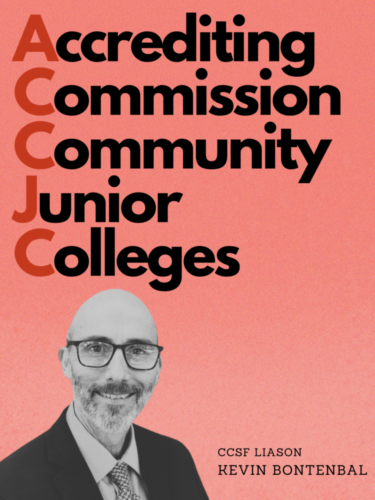Accrediting Commission for Community and Junior Colleges Arrives Oct. 2
By Gene Thompson
offstage@earthlink.net
The powerful Accrediting Commission for Community and Junior Colleges (ACCJC) will arrive at City College on Oct. 2 to conduct a “focused site visit,” part of a process that occurs every seven years and ultimately will result in the ACCJC determining the accreditation status of the college.
Institutions that meet the ACCJC’s criteria retain their accreditation and can continue to receive government funding and award Associate of Arts degrees. If the commission determines the college is deficient in some way that is amenable to improvement, it may issue a warning with a direction to correct the deficiency. In cases where more serious shortcomings are assessed, probation may be prescribed. And for very serious inadequacies, the college may be disciplined with the most severe sanction, show cause, which requires the school to prove why it deserves not to have its accreditation removed.

In 2012, the ACCJC sanctioned City College of San Francisco with show cause and voted to revoke its accreditation. The action made national news as San Francisco scrambled to save the beloved college. The California Community Colleges Board of Governors stripped City College’s Board of Trustees of power and installed a special trustee. City Attorney Dennis Herrera, the California Teachers Association, and a union-led class action coalition of students, community members, teachers and other campus employees successfully sued the ACCJC on various grounds. The revoking of accreditation was postponed in court and later rescinded. But the nearly fatal blow had struck fear into the college community as people realized City College might be forced to close.
Denise Selleck, a recently retired ESL instructor who was teaching ESL at City College during the ACCJC action recalled her feelings at the time. “I was scared and angry. We all thought we would lose our jobs, even full timers. I remember being in Bed Bath and Beyond and seeing all these older people working there and bursting into tears because that’s where I figured I would end up after losing my job.”
The college community has been working hard to avoid a repeat of that nightmare. Teachers, administrators, students and board trustees have produced a 188-page institutional self-evaluation report (ISER), in which the college assesses how well it is meeting the ACCJC’s criteria for accreditation. The report was submitted to the commission’s peer-review team in December 2022 and the team developed nine core inquiries.
According to the Summary of Team ISER Review, “Core Inquiries are a means for communicating potential areas of institutional non-compliance, improvement, or exemplary practice that arise during the Team ISER Review.”
The City College Accreditation Steering Committee, chaired by Sheri Miraglia and Kristin Charles, developed responses to the inquiries, which were approved at the Board of Trustees regular meeting on Aug. 24. The ACCJC peer-review visiting team will use these responses as they conduct interviews and examine documents at the campus.
Several of the core inquiries deal with financial matters, which is not surprising considering that the ACCJC has kept City College under enhanced financial monitoring for over three years. Enhanced monitoring is not a sanction but can lead to one if deficiencies are not corrected. The college has worn this millstone for so long due to the commission’s observation of deficit spending, and what it regards as insufficient levels of reserve funding, and other financial problems. The analysis of these factors has been an important source of controversy as various stakeholders, particularly the unions, disagree with the administration about how limited funds should be spent.
The ACCJC can greatly influence the behavior of an administration. The layoffs that were initiated by Chancellor Martin and approved by the Board of Trustees on May 6, 2022 are an example. When he recommended the layoffs to the board, Martin said, “These staffing adjustments are critical for the 2022-23 budget as this budget year will be used as evidence during CCSF’s comprehensive accreditation evaluation scheduled in the spring of 2023. This evaluation will determine CCSF’s accreditation status through 2030.”
But from the perspective of the teachers union, AFT 2121, laying off teachers to fund reserves robs Peter to pay Paul. In the wake of the 2022 layoffs there were not enough teachers to teach essential classes. Students were unable to register for required courses, reducing enrollment-based funding from the state. In addition, the union says, administration frugality and stalling at the bargaining table has resulted in the union functioning without a contract for over two years. The ACCJC does take into account student enrollment and labor relations in their consideration of the college’s health.
AFT President Mary Bravewoman said, “AFT supports taking actions that will provide the stability of the college moving forward. This would include maintaining sufficient staffing to offer the full complement of classes that students want and need, increasing enrollment, and identifying long-term, stable funding … Of course, we would like to see the college settle its contracts with all labor groups before the accrediting team visit later this semester.”
According to the administration’s accreditation website, https://www.ccsf.edu/news/city-college-san-francisco-ccsf-host-accreditation-site-visit, “Students, faculty, staff, and members of the public are invited to an open forum on Tuesday, October 3, during which the visiting team will solicit input. To ensure participants can express themselves freely, neither members of the governing board nor senior leaders will attend this session.” The entire process will conclude with the commission’s report in January 2024.
Board of Trustees Vice President Martinez is hopeful for a positive outcome. “The self-study is well done,” she said, “and ACCJC will be focusing on the core inquiries during the team’s visit in October. The report on the college’s responses to the core inquiries made at the last board meeting is also well-prepared, decreasing the likelihood of increased sanctions.”
